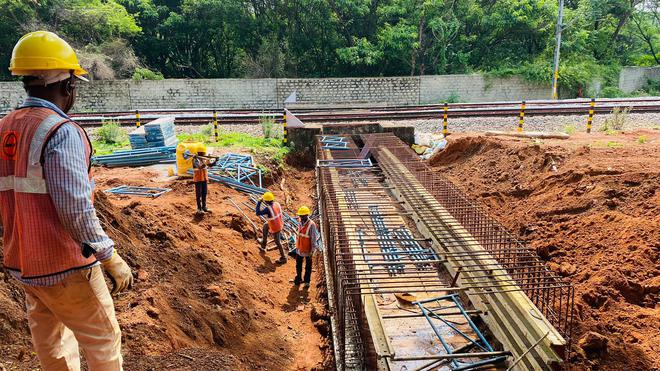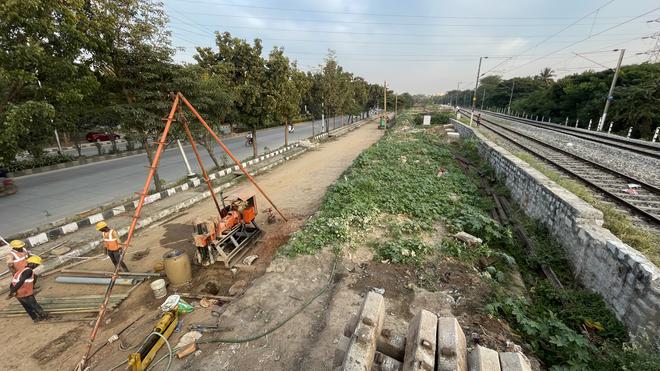The grand, four-corridor, suburban rail network for Bengaluru, a potential game-changer to solve the city’s perennial mobility issues, is at the crossroads. Six months of on-ground work that followed 26 months of relative inactivity has injected fresh hope into the much-delayed project, even as questions linger about the new government’s ability to take it forward.
The intent is there, as articulated in the 2023-24 Karnataka budget allocating ₹1,000 crore for the project, in addition to the ₹660 crore already released. In effect, this amounts to over half of the State’s 20% share of ₹2,479 crore in the project cost. But the question is: Will this accelerate the pace of a project that has taken well over 34 years since it was first proposed?
Seasoned commuter rail activists and experts note that virtually nothing moved from October 2020 to December 2022. This, after Prime Minister Narendra Modi set a 40-month deadline to complete the project. However, preparatory work on tenders has picked up considerably over the last six months, and this could change the project dynamics.
One corridor by April 2026
“Work has already started. They have called tenders for coaches, stations and depots. Realistically, the first corridor – KSR Bengaluru to Devanahalli – should be ready for running trains by December 2025, if they maintain the pace of work. At least one line should be in operation by March-April 2026,” notes Sanjeev Dyamannavar, an urban rail analyst, who has been tracking the project for decades.

“Meeting the 40-month deadline is completely out of the question at this stage,” says Rajkumar Dugar, another active campaigner for the project. “We have already lost 13 months. Till today, less than 8% of one corridor is complete, which means less than 2% of the entire project. In the remaining 27 months, doing 98% of the work is absolutely impossible. So now, we have to look at a practical deadline of October 2026, which is as per the sanction letter,” he elaborates.
A lot will depend on what happens this year. “We have specifically requested them to close all the tenders within this calendar year, and work on all four corridors,” he says.
“Completion of the other corridors will depend on when they call for tenders and finalise them,” adds Sanjeev.
Tasked with executing the project as a Special Project Vehicle (SPV), the Karnataka Rail Infrastructure Development Company Limited (K-RIDE) has taken over 157 acres of railway land in December 2022. The existing encroachments and railway structures are being removed. Acquisition of private, government and defence land is also in progress. KRIDE officials say it has identified the 8km-Chikkabanavara to Yeshwantpur line as a priority stretch to be commissioned first.
Approvals from SWR
But the challenges that K-RIDE faces, as Sanjeev explains, are these: “Whatever the Detailed Project Report (DPR) has approved as corridors, they have to once again take approvals from the South Western Railway (SWR), Bengaluru division, and this is mandatory to start work, estimate the exact distance of separation from existing live tracks, power and communication cables, etc. This needs to be done along the entire length.”
Other structural design challenges had also cropped up, delaying the project.
“Along the Heelalige – Rajanakunte corridor, a double-decker flyover for both Namma Metro and suburban rail was supposed to come up. K-RIDE had to consult Indian Institute of Science (IISc.) to sort out the issue related to electro-magnetic interference of the overhead metro rail cable (third rail), and the suburban line cable barely 2-3 metres under it. The voltage difference was also very high. They now have to shield the cables along a 450-metre distance. This is a first in India.”
Correcting track deviations
The suburban rail system has another key task. To correct the deviation in the existing tracks, as these are acceptable only for the tracks running now.
“K-RIDE is building suburban tracks either next to those tracks or over them. In many places, those deviations have to be corrected at K-RIDE’s cost, not SWR’s. Those issues are also getting resolved,” says Sanjeev.
Inevitably, this process too takes time.

Along the Kengeri-Whitefield corridor, the DPR states that the project can be integrated with the quadrupling of tracks between Cantonment and Whitefield. But SWR insists that all four tracks will be required for its trains. One suggestion is bringing the existing suburban KSR Bengaluru-Bangarpet passenger trains under the project could increase the capacity of the old tracks for SWR. Two tracks can then be used for the corridor.
Lack of push from MLAs, MPs
But beyond all these challenges, a perceptible lack of push from the elected representatives has left the suburban rail project away from the spotlight.
Laments Rajkumar, “It is extremely unfortunate that when we talk about public transport, everyone talks about the BMTC and metro, but stops there. Suburban rail is not on the radar as far as the general public, and the MLAs and MPs are concerned. There is a public perception that such trains are only for inter-city and long-distance commuting.”
Most MLAs, he says, are not even aware of the project details.
“No MLA has gone to K-RIDE and done a review, asked questions whether the lines pass through their constituency. They should, because it directly affects their constituents. MPs too are not taking much interest. Just getting a sanction is not the end of the game. They have to monitor and facilitate all solutions that K-RIDE is facing. There is a huge lacuna, and this needs to be filled,” he explains.
The support is missing, agrees Sanjeev. “Wherever approvals are required from other stakeholders, shifting gas lines, BBMP, BDA, BWSSB, they should give the clearance. They should help in sorting out these issues, and not keep them pending for months, and years. Our MLAs and MPs should champion the cause of the suburban rail,” he says.
Proven advantage
Over the decades, demand for a well-networked suburban rail network has been growing in Bengaluru since it has proven advantages over other mass transit options — more economical, eco-friendly, safe, comfortable and fast.
As Rajkumar points out, the average speed would be much higher because as soon as a metro train accelerates, it has to decelerate due to the much shorter inter-station distances.
The tasks ahead for K-RIDE are clear: Call tenders for the three remaining corridors — KSR Bengaluru to Devanahalli, Heelalige to Rajanakunte, and Kengeri to Whitefield — by March 2024, finalise, award and kickstart work on depots, stations, coaches and other related projects.
The funds allocated, so far, are expected to be sufficient for the work now in progress.
Meanwhile, K-RIDE is awaiting hand over of 193 acres of land requested from SWR in January 2023.
“Private land is being acquired through KIADB (Karnataka Industrial Area Development Board), for which preliminary notification, which was pending because of elections, is being expedited,” informs an official.
Corridor-4 alignment has been approved, in principle, by the SWR.
K-RIDE has so far received ₹660 crore from the Karnataka government, and ₹500 crore from the Union Ministry of Railways. The Centre’s Department of Economic Affairs (DEA) proposes to raise €800 million (₹7,438 crore) from bilateral funding agencies KfW, Germany (€500 million) and European Investment bank (EIB), Luxembourg (€300 million). The loan agreement is planned for December 2023, according to the official.







